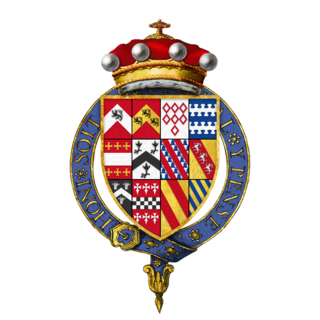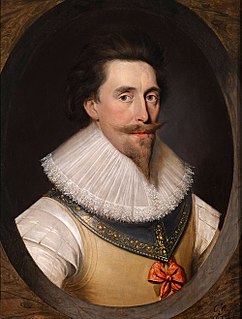See also
| | This disambiguation page lists articles about people with the same name. If an internal link led you here, you may wish to change the link to point directly to the intended article. |
John Cobham may refer to:
| | This disambiguation page lists articles about people with the same name. If an internal link led you here, you may wish to change the link to point directly to the intended article. |
John Smyth may refer to:
John Evans may refer to:

Henry de Cobham, 1st Baron Cobham lord of the Manor of Cobham, Kent and of Cooling, both in Kent, was an English peer.

Henry Brooke, 11th Baron Cobham, lord of the Manor of Cobham, Kent, was an English peer who was implicated in the Main Plot against the rule of James I of England.
John Cobham, 3rd Baron Cobham, lord of the Manor of Cobham, Kent, was the son of John Cobham, 2nd Baron Cobham, and Joan Beauchamp, John Beauchamp, 1st Baron Beauchamp of Somerset. He was given a licence to crenellate by Richard II in 1381 and built Cooling Castle at the family seat at Cowling or Cooling, Kent.
John Foster may refer to:
John Burton may refer to:

George Brooke, 9th Baron Cobham KG, lord of the Manor of Cobham, Kent and of Cooling Castle, Kent, was an English peer, soldier and magnate, who participated in the political turmoil following the death of King Henry VIII.
Robert Sutton may refer to:

Francis Fane, 1st Earl of Westmorland, of Mereworth in Kent and of Apethorpe Hall in Northamptonshire was an English landowner and politician who sat in the House of Commons between 1601 and 1624 and then was raised to the Peerage as Earl of Westmorland.

Sir Arnold Savage of Bobbing, Kent was the English Speaker of the House of Commons from 1400 to 1402 and then again from 1403 to 1404 and a Knight of the Shire of Kent who was referred to as "the great comprehensive symbol of the English people".
John Cole may refer to:
John Eyre may refer to:
Richard Grey (1457–1483) was a son of Elizabeth Woodville, queen of England.
John Wingfield may refer to:
John Lawrence Cobham was an Anglican priest.
John Oldcastle Cobham (1899–1987) was an Anglican priest and author.
Edward Moore, D.D. (1714–1788) was an Irish Anglican priest.

The title Baron Cobham has been created numerous times in the Peerage of England; often multiple creations have been extant simultaneously, especially in the fourteenth century.

Cobham College in the village of Cobham in Kent, England, was a chantry employing a college of five priests founded by in 1362 by John Cobham, 3rd Baron Cobham, of nearby Cobham Hall, lord of the manor of Cobham, for the purpose of praying for the speedy passage of his soul through Purgatory and into Heaven.